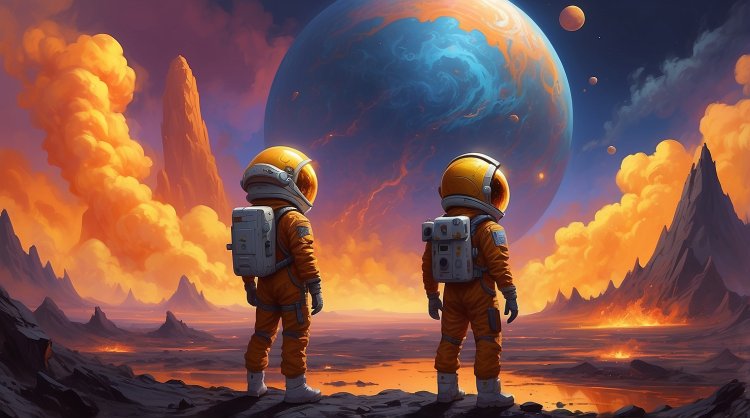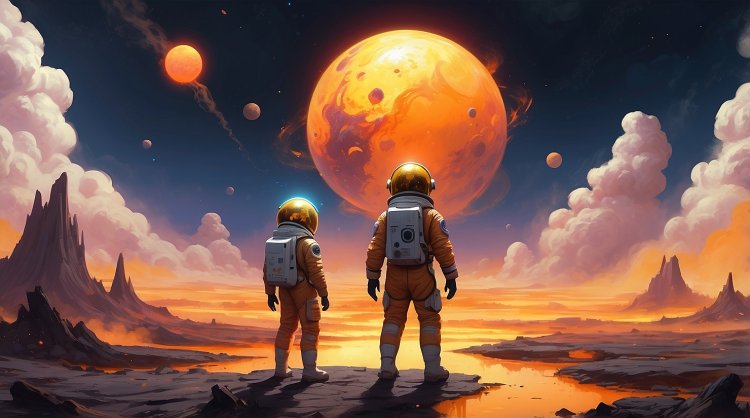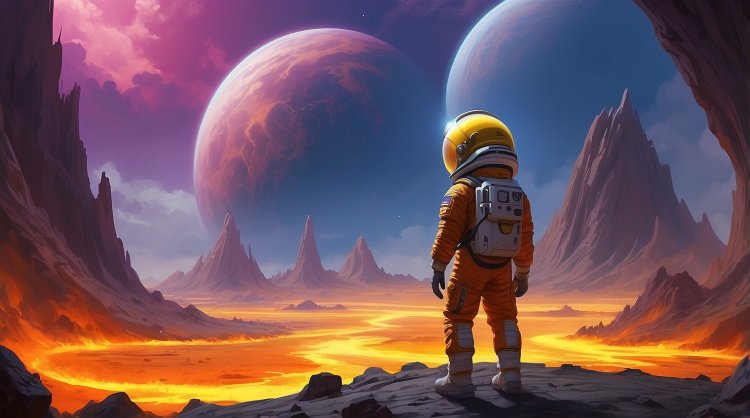Venus – The Hot Sister of Earth
Star Max, the brave space explorer, travels to Venus to study its scorching atmosphere and understand how the greenhouse effect has transformed this planet.

In the vast expanse of space, Star Max travels aboard his trusty spaceship, the "Astrojet." He is an astronaut and explorer dedicated to uncovering the secrets of the universe. Accompanying Max is his faithful helper, Astro-Bot, a small robot that helps collect data and conduct experiments.
“Where are we heading today, Max?” asked Astro-Bot, its lights blinking brightly.
Max smiled: “Today, we’re going to Venus! It’s a planet similar in size and shape to Earth. They even call it the ‘sister planet of Earth.’ But Venus has a mystery: it’s much hotter than Mercury, even though it’s farther from the Sun. I want to find out why!”

The ship approached Venus, and Max saw it through the porthole. The planet was shrouded in thick yellow clouds that completely obscured its surface. Max activated the ship’s protective systems to handle the extreme conditions.
“Max, I’m detecting extremely high temperatures,” reported Astro-Bot. “On Venus’s surface, it’s around +465 degrees Celsius. That’s hotter than Mercury!”
Max was astonished: “How is that possible? Venus is farther from the Sun.”
Astro-Bot explained: “It’s because of its atmosphere. It’s made almost entirely of carbon dioxide. This creates a powerful greenhouse effect: sunlight passes through the clouds, but the heat gets trapped, warming the planet.”

Max adjusted the instruments to scan Venus’s surface. Through the clouds, he could map the planet. The surface was covered in solidified lava, plains, and mountains. It looked like a scorched desert.
“It looks like a giant oven,” said Max, recording his observations. “It never rains here, and instead of water, drops of sulfuric acid fall from the clouds. Even rocks melt at these temperatures.”
Max decided to land on one of the mountain plains. As soon as he stepped outside, the protective systems of his suit worked at full capacity. The air was so dense that everything seemed dark and heavy.

Max placed a thermometer on the ground, and it immediately read +465 degrees. He reflected: “If Venus had an atmosphere like Earth, it might have been habitable. But carbon dioxide has created conditions so extreme that the planet seems like a fiery inferno.”
Astro-Bot added: “Venus is a warning for us. If we emit too much carbon dioxide into Earth’s atmosphere, the same thing could happen here.”
Max nodded: “You’re right. We must take care of our planet to avoid such a greenhouse effect.”

After collecting atmospheric samples and temperature data, Max returned to the ship. He looked at Venus through the porthole and said: “This planet has taught us a lot. Taking care of the environment isn’t just a saying. It’s essential for the future of our Earth.”
Astro-Bot blinked its lights in agreement: “Absolutely right, Max. We must remember Venus’s lesson.”
The "Astrojet" lifted into space, leaving the scorching planet behind. Max made a note in his journal: “Venus has taught us that the greenhouse effect can transform an entire planet. We must protect Earth so it remains a home for all of us.”
What's Your Reaction?




















